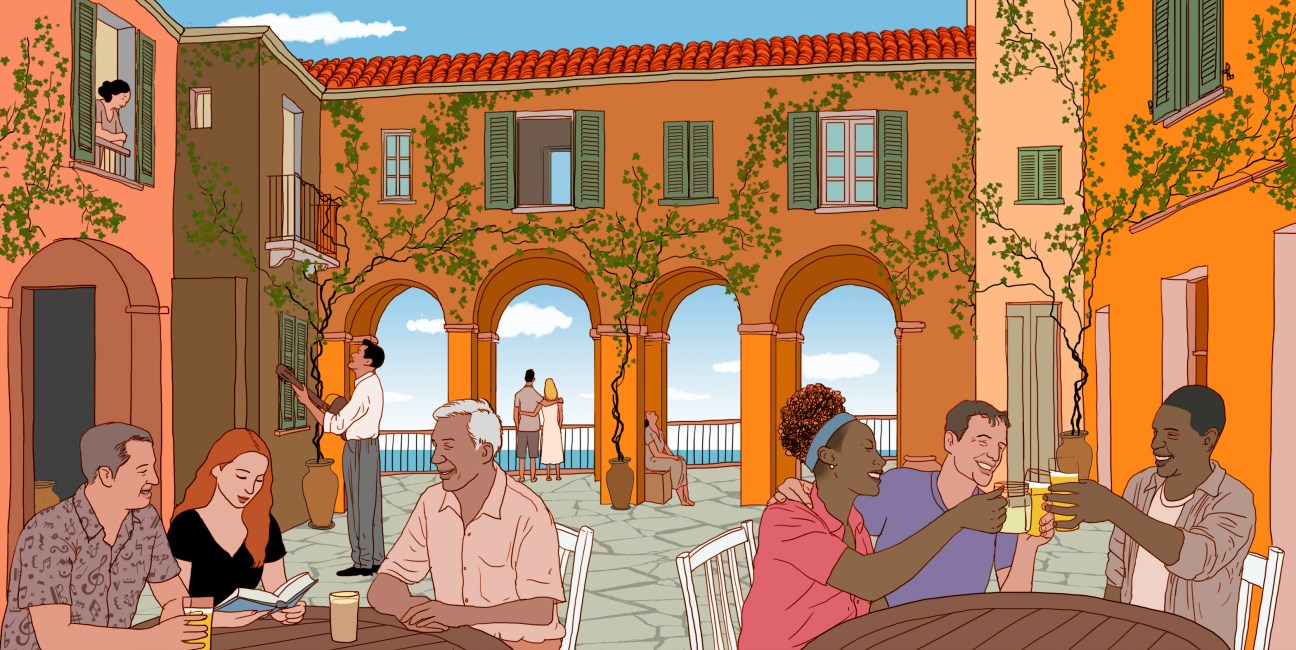The radical notion of the ‘Mediterranean spirit’ and why we need it now more than ever
Novelist Albert Camus had it right: happiness lies in living in harmony with our surroundings. But what can this idea teach us about finding human connections in cities today?
In our fast-moving world, the Mediterranean feels like a refuge, both metaphorically and physically. It’s a place where time doesn’t rush. Last summer almost 330 million tourists arrived on its sandy fringes in search of peace. People might say that they’re coming for the sun and the sea but that’s not quite all of it. The light is different here. The pace is slower. What they’re really chasing is a sensibility, a rhythm, a way of life that doesn’t involve to-do lists or deadlines.
French-Algerian writer Albert Camus called this the “Mediterranean spirit”. He was just 23 years old when he stood at the Maison de la Culture in Algiers in 1937 and began to articulate something that many of us still sense. For Camus, the lightness of this spirit was inseparable from the darker, existential awareness of life’s absurdity, which informed his work, writing and philosophy.
The absence of inherent meaning in the world didn’t lead him to nihilism. Inspired by the Mediterranean, he called instead for us to seek a quiet resolve and live in harmony with one’s surroundings. “What is happiness except the simple harmony between a man and the life he leads?” he wrote in The Myth of Sisyphus. To him, harmony was the cure for life’s absurdity and the Mediterranean spirit was his North Star.

Born in Algeria to French parents, Camus was suspended between incompatible allegiances. He was French but not quite; Algerian but never enough. He was a stranger to both and at home in neither. I too have lived at such an intersection, experiencing a similar dialectic. Born to European parents, I came of age in Turkey, a country forever negotiating its place between East and West. The tension of not fully belonging anywhere resulted in a constant sense of estrangement and searching. Like the Mediterranean, my life lapped many shores.
Many influential and itinerant 20th-century writers shared this sense of not belonging. Philosopher Hannah Arendt, who chronicled the trials of Adolf Eichmann in Israel, found refuge in calling the German language her home. Palestinian-American academic Edward Said described himself as always “out of place” and discovered a form of home in exile. For James Baldwin, whether he was in New York or in Saint-Paul de Vence on the south coast of France, home was found
in the moral clarity of his writing.
All of these writers had a connection with at least some corner of the Mediterranean but Camus overcame his strangerhood by calling the entire Mediterranean his home – not France, not Algeria. I understand what it means to belong to a climate, rather than a country: a home shaped by the sun, the sea and the play of light. That home is also mine. Camus’s belonging was about building a relationship with one’s surroundings – an act of guardianship, tending to a landscape, a pace of life. It was not belonging in the widely understood sense. It was about being a custodian of things that made one’s inner life flourish. The idea is as useful today as it was then, as many of us sit divided by politics or in cities far from nature, family or a sense of community.
More than four billion people live in cities today; by 2050 that figure will more than double. Urban life has become the default but the question of belonging grows harder to answer. We occupy flats where neighbours remain strangers. We spend hours isolated in cars or in overcrowded train carriages. It’s a solitude that is collective, an urban loneliness that connects us only through our shared disconnection. Technology promised to bring us together but delivered distance. It all becomes even more unsettling when technology moguls suggest AI as a solution to our shared loneliness. Meta’s founder, Mark Zuckerberg, talked recently about a future in which the majority of your friends might be AI. Who could possibly want that? Not me, nor many people I know. That’s a world in which few people could belong.
That is why we need the Mediterranean spirit more than ever. Not as a gimmick or a beach escape but as a kind of rebellion and a reset. What will save us is not another algorithm but the stubborn act of feeling alive and connected – to the Earth and to each other. The summer can be a moment to remember why we’re here and the simple pleasures that can’t be optimised on spreadsheets: the sun-warmed tomato, the cool beer in the midday sun, the act of submerging yourself in water. The Mediterranean refuses efficiency. It resists the logic of schedules. The Mediterranean, not Silicon Valley, gave us la dolce vita and no amount of machine learning could improve that.
De Cramer is an Istanbul-based journalist. She is a frequent contributor to Monocle and its sister publication, ‘Konfekt’.


